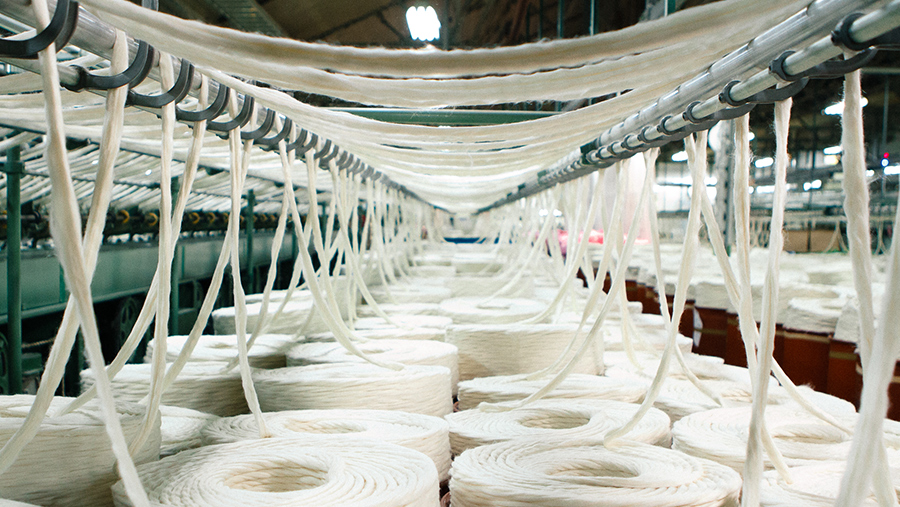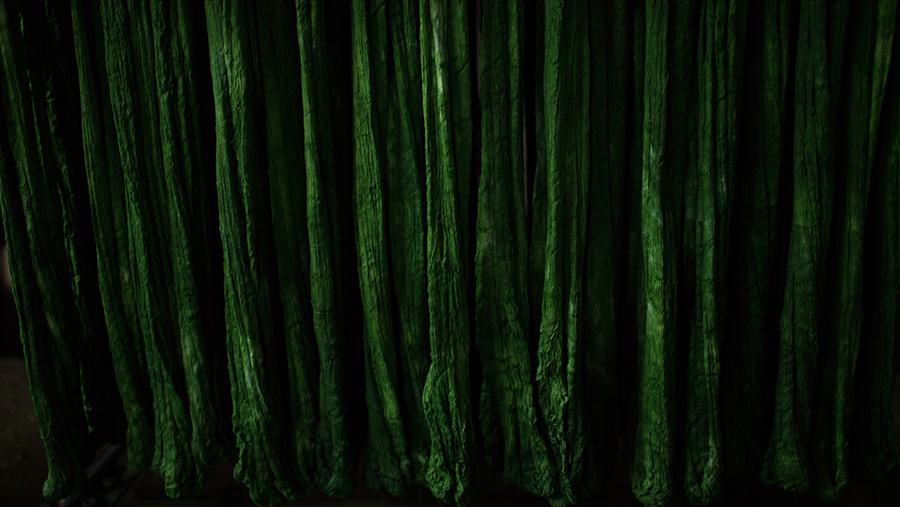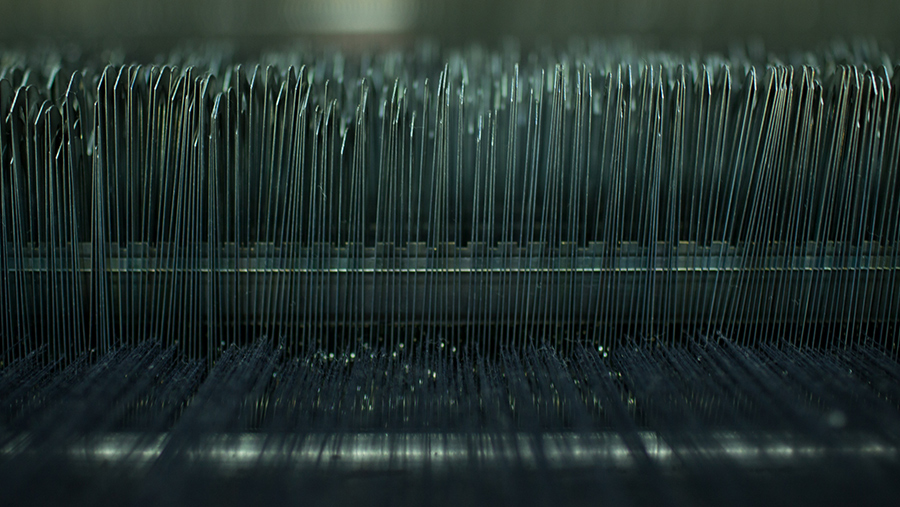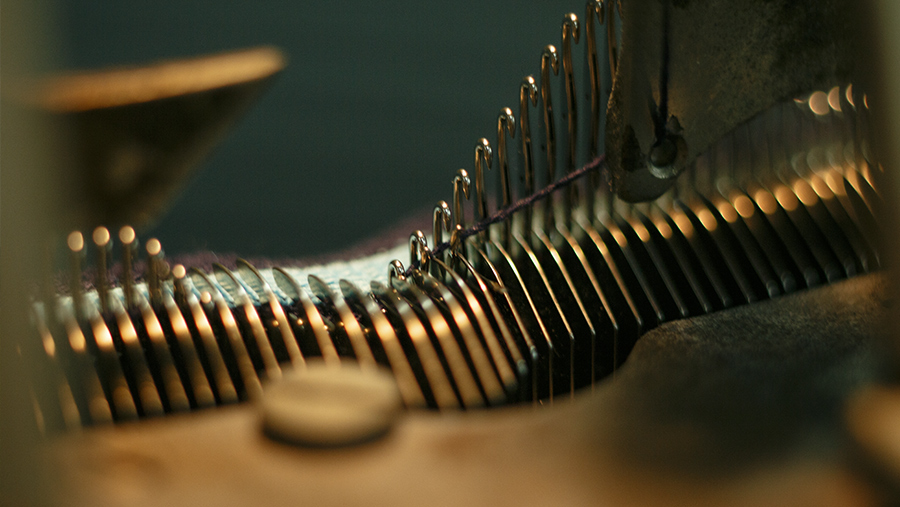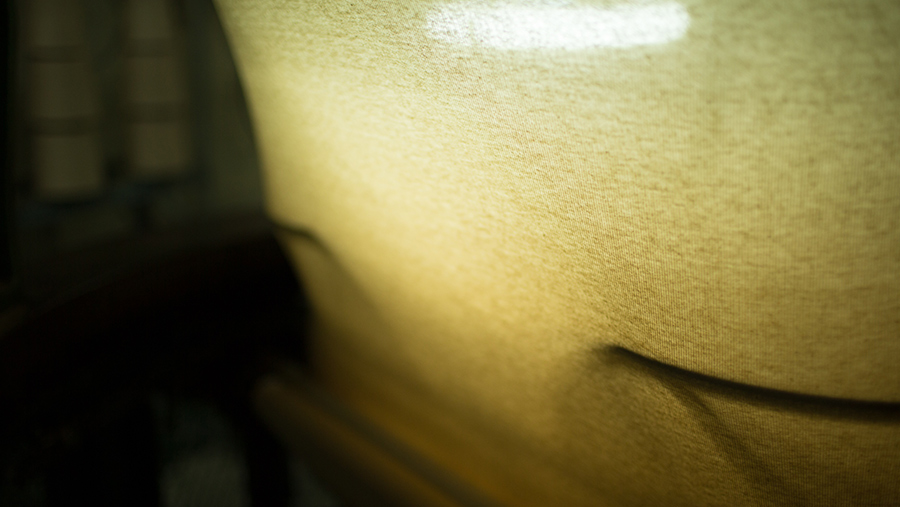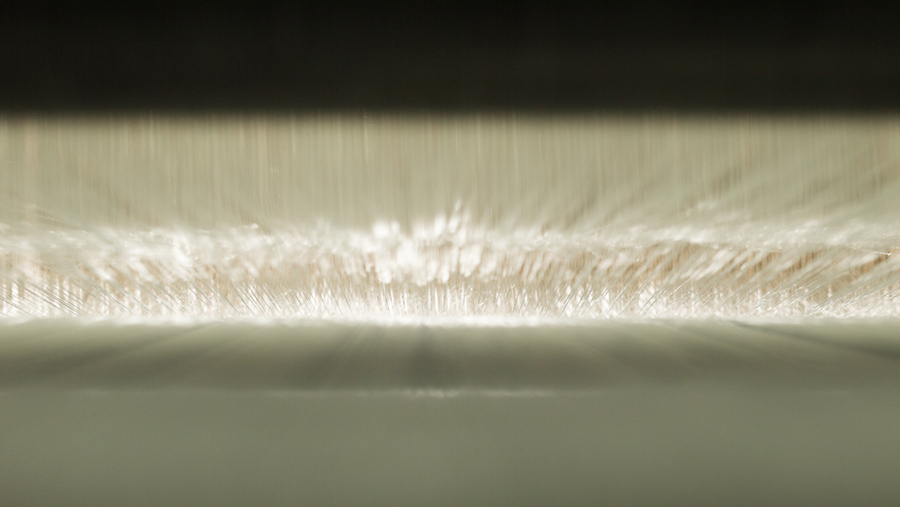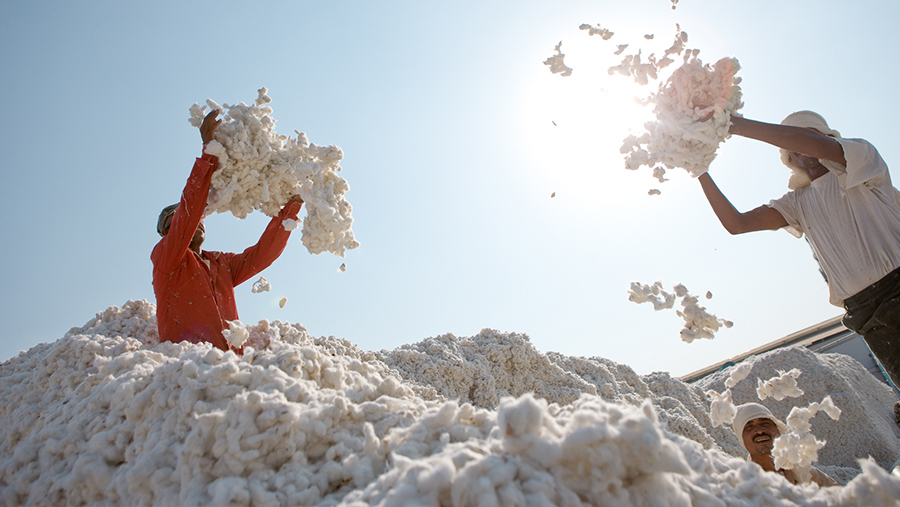大正紡績 Taisho Boseki - Spinning
大正7年、繊維産業の地として歴史のある大阪泉州に設立された大正紡績は、世界中から素材を集め、メーカー、デザイナーから生地や布のニーズを細かく聞き取り、それに応える独自で高品質な糸を開発しています。糸に使う原料を仕入れるときは、世界各地の生産農家へ直接足を運びます。直接に生産農家と取引することで、現場の生産者がどのようにワタを栽培するか、品質の高い原料であるかを確認することができます。トレーサビリティを確保した安心で安全なオーガニックな原料を、高い商品開発力で人々を幸せにする糸を作ります。
In 1918, Taisho Boseki was founded in Senshu Osaka, the center of the textile industry of Japan. To meet the needs of their customers and designers all over the world, Taisho Boseki produces high quality yarn using various raw materials from throughout the world. They never buy raw material without visiting the land. Directly communicating with the farmers, Taisho Boseki ensures the quality of the material they use. Taisho Boseki's identity is their high-quality yarn spun with organic materials with an assured traceability.
日本綿布 Nihon Menpu - Denim
日本綿布は大正9年に岡山県井原市で創業しました。“備中小倉”に発する撚糸技術、織布技術を現在まで受け継ぎ、デニムの生地作りに活かしています。大量生産ではなく、一玉一玉丹精を込めて染色し、丁寧に織り上げた反物から生まれるジーンズはそれぞれに特色のある表情(風合い)があり、オリジナルです。職人一人一人がプライドを持ってローテンションのシャトル織機で作られたデニムは、昔ながらの人の手の温もりが織りなされています。
Nihon Menpu started its history in 1920 in Ibara Okayama, an area famous for production of denim. The tradition and technique of yarn-twisting and fabric-making which originates with a fabric called “Bichu Kokura” has been handed down for decades until today. Dyed with care and weaved into fabrics, craft produced jeans of Nihon Menpu has its unique texture. We can find the craftspersonship of Nihon Menpu in these old-fashioned jeans weaved with low-speed shuttle loom machines.
吉河織物 Yoshikawa Orimono - Jacquard
吉河織物は昭和22年、江戸時代からの綿の産地である岡山県井原市で創業しました。日本でも有数のジャカード織機の保有台数を誇っています。デザイナーから提案されるさまざまな図柄のリクエスト。精緻な図柄を丹念に設計し、ジャガード織機で組織の組み合わせにより、凹凸感、透かし柄など多彩な表現を行います。デザイナー、そして原料糸を作る紡績との丁寧なやり取りを積み上げていくことで、高品質の新しい生地を生み出し続けています。
Yoshikawa Orimono was founded in 1947 in Ibara Okayama, where cotton has been grown since the Edo era. Today, they are one of the largest holders of jacquard looms in Japan. Requirements from designers are various and complicated but Yoshikawa forms an accurate visual pattern to meet these requests. They create a variety of fabrics of limitless designs by making full use of their jacquard looms. With continuous collaboration with many designers and yarn suppliers, the quality of Yoshikawa-made fabrics is always kept stable and high.
オカザキニット Okazaki Knit - Knit
オカザキニットは昭和25年、ニット産地である和歌山県和歌山市で創業しました。メリヤス肌着用の生地の編立製造からスタートし、現在はポロシャツ、トレーナー、Tシャツ、スウェット等に代表される丸編みカットソーの編立製造へと発展してきました。常に新しいモノづくりに取り組むため、糸からの作り込みを行う企画・開発を手掛けています。日本国内だけでなく世界に認められる品質を追求しながら、地域社会と共生し躍進を続けるニットメーカーです。
Okazaki Knit was founded in 1950 in Wakayama, a Japanese knitting industry area. They started their business from knitted undershirts, and today, they also produce various products such as polo shirts, T-shirts, sweat shirts and sweat pants. Each product of Okazaki Knit is developed from its yarn for the purpose of introducing new quality and value to the market. They challenge themselves with pursuing World-class quality, and their progress never stops.
森下メリヤス工場 Morishita Knitting Factory - Knit
森下メリヤスは1907年に創業。200機を超える古今さまざまな編み機を大切に保有、メンテナンスしています。また、世界有数のニット産業集積地である和歌山には、編み工場だけでなく、染色、加工工場も集まっています。100年以上に渡って蓄積してきたニット生産の技術的ノウハウを活かし、これら協力工場と複合的に企画に取り組むことで新しい、高品質なジャパンクオリティの生地を企画、生産し続けています。
Founded in 1907, Morishita Knitting Factory has been treasuring various knitting machines from traditional to modern, and today their collection adds up to more than 200. Wakayama, where their factory is located, is home to a number of Japanese knitting companies, as well as many dyeing and processing factories. Collaborating with these partners and utilizing their own knowledge which has been accumulated for more than a century, Morishita Knitting Factory keeps on introducing new outstanding “Japan Quality” fabrics to the world.
渡辺パイル織物 Watanabe Pile Textile - Towel
日本最大のタオル産地、四国の今治で1963年に創業した渡辺パイル。素材を最大限活かしたタオルつくりを目指し、よく水を吸い、よく乾く、使って気持ちのよいパイル生地の開発を行っています。今回のタオル生地には今治産のシャトル機が使われています。昭和38年に導入した今治の織機製造メーカー“村秀”製の織機。今治産のシャトル織機が現役で動いているのは、織機をメンテナンスできる職人が残っているここだけです。最新の高速織機エアジェットが1分間550回転なのに比べ、この織機は1分間で100回転しかしません。仕上がりは遅いですが、一つ一つしっかり打ち込むため、密度が高く、丈夫で質の高い生地に仕上がります。
Watanabe Pile Textile was founded in 1963 in the greatest towel manufacturing area of Japan, Imabari. This company spares no effort to bring the best out of the materials to produce towel fabrics. The towels of everloom are wove using a Murahide shuttle looming machine which was made in Imabari. More than a half century has passed since they started using this machine in 1963, and due to lack of engineers who can properly maintain this machine, today it is the only one on active service in Japan. While the speeds of newest air jet models are around 550rpm, Murahide machine's is only 100rpm. The process is slow, but the products are tight and strong. The pile fabrics made by Watanabe are carefully produced in a traditional way, and become high quality towels.
ラジ・エコ・ファーム RAJ ECO FARMS
ラジ・エコ・ファームは、2000年に設立されたインド マディア・プラデーシュ州カルゴーン県にて活動する、インド最大級のオーガニック農業支援団体です。2008年より“プレオーガニックコットンプログラム”で提携し、現地農村でのプログラム運営、並びに原綿の供給を担っています。
毎年3月頃、オーガニック栽培を希望する農家を募集し、収穫時にオーガニック栽培支援費を上乗せして購入します。また、オーガニック認証の条件である、遺伝子組み換えをしていない種を提供するほか、各農村を日々訪問し、オーガニック農法に不慣れな農家への技術指導や、コンポスト等のオーガニック農法に有益な農業設備を準備します。また各畑で農薬が使われていないかフィールドモニタリングを行い、オーガニック栽培の世界基準に沿うよう、第三者機関の認証をコーディネートします。農家の負担軽減とトレーサビリティの信頼性向上のため、各コットン農家にてコットンの収集を行い、農地からコットンの種を除去するジン工場までの物流を引き受けます。種の除去行程終了後、オーガニックコットン原綿、ならびにオーガニックへの移行期間綿として出荷します。
The Raj Eco Farms is one of the largest groups supporting organic farming in India, established in 2000 in Khargone District. From the year of 2008, we and the Raj Eco Farms have been working together to operate the “Pre Organic Cotton Program.” Each year, around March, we invite farmers who want to switch to organic farming, and in the harvesting season, we purchase their raw cotton for a special price to support them. We also provide guidance and assistance so that they can obtain certification from third party world certification authorities for organic cotton. In order to improve the traceability of cotton grown through this program, we gather raw cotton from each farmer and transport them directly to the ginning factory. After the ginning process, we ship them out as organic cotton or organic cotton in conversion.








